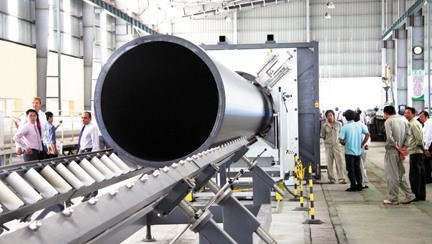52 State-owned enterprises equitised in 11 months
The country has equitised 52 State-owned enterprises (SOEs) in the past 11 months, the Steering Board for SOEs Renovation and Development has said.
 Illustrative image. (Photo: nhuatienphong.vn)
Illustrative image. (Photo: nhuatienphong.vn) Hanoi (VNA) - The country has equitised 52 State-owned enterprises (SOEs) in the past 11 months, the Steering Board for SOEs Renovation and Development has said.
With the equitisation, the State sold shares worth more than 2.814 trillion VND (125 million USD) in book value for more than 5.086 trillion VND.
The SOEs are mainly those owned by the Ministry of Industry and Trade, Ministry of Construction, Ministry of Transport, Vietnam Rubber Corporation, and State Capital Investment Corporation (SCIC).
In 2011-15, the country equitised, merged or closed down 591 SOEs, which was 96 percent of the target, the steering committee said.
However, the process of equitisation is facing obstacles because of incomplete legal regulations. To date, several ministries haven’t submitted seven regulations related to equitisation to relevant authorities for approval as planned.
To speed up the next round of equitisation, the National Assembly adopted a resolution that includes reform targets for SOEs in the 2016-20 period. The emphasis is on the SOE reform process becoming “faster and stronger” and the equitisation process becoming transparent, in line with the market mechanism.
According to the resolution, SOEs that go through equitisation must list on the stock exchange one year before they can conduct an initial public offering (IPO) and attract strategic investors. The SOEs’ loss-making investment projects will be set for bankruptcy.
Nguyen Trong Dung, deputy head of the steering committee, said that by 2020 the Government would fully retain only 190 of 718 SOEs in 12 vital sectors, such as electricity transmission, cartography related to national security and military, railway infrastructure, air traffic services, post, irrigation management, lending for socio-economic development, banking safety and lottery.
While it would speed up equitisation, it would retain at least 65 percent of the companies in airlines services, large-scale mining and banking, excluding insurance, securities, finance and fund management, Dung said, adding that in all other fields, the State would hold on to only 50-65 percent. — VNA













